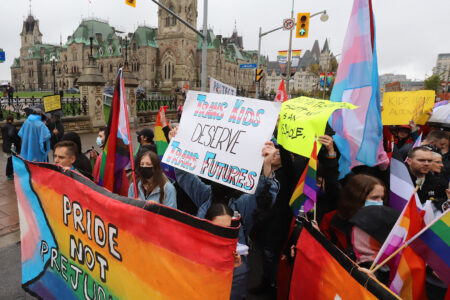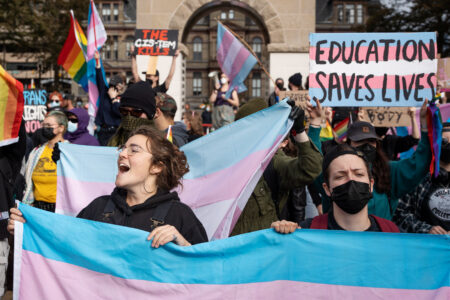
There is an assumption which underpins all campaign contribution limits, that without them, the electoral process and governments are somehow beholden to corporate interests. The notion has been repeated so often, it’s become common wisdom. That does not, however, mean it is valid.
Ontario, facing pressure from the media, has succumbed to this simplistic assumption around political contributions. It has introduced (and re-introduced) changes to the electoral financing regime. In one fell swoop, it has limited contributions made by individuals to $1200.00, eliminated contributions by corporations and unions, and placed significant limitations on third party advertising, and the coordination of paid media messages. It has now proposed who can attend these fundraising events, limiting senior government decision makers (political staff) to ensure that there is no whiff of ‘cash for access.’
What has been missing from the discussion around political financing is the question of free speech. Political contributions are a very real manifestation of this freedom. In a world where everyone can access the world one tweet at a time, being able to expend resources becomes essential to seeing a message resonate.
The changes in Ontario, I would argue, are constitutionally suspect. Money is speech, and virtually all modern jurisprudence relating to campaign contributions stems from the concept that in order to effectively communicate your ideas in the modern era of politics you have to be able to spend your way, within reasonable limits, onto the agenda.
The new provincial limits closely mirror those found in the Federal Accountability Act (FAA), which placed similar limitations on federal contributors. The FAA eliminated the ability of unions and corporations to make election contributions, as well as significantly reduced the ability for individual citizens to make contributions. Ontario also borrowed from the changes to the electoral financing regime introduced by Prime Minister Jean Chrétien. Donations will be replaced with a per-vote public subsidy. Let’s be clear: this does not limit the role of money in politics. Rather, this just changes where the money comes from.
There is no doubt that the status quo in Ontario was politically unacceptable to almost everyone involved – and significantly favoured the government both tactically and financially. But are we achieving an appropriate balance between safeguarding the freedoms guaranteed in the Charter of Rights and Freedoms and simultaneously ensuring that elections are not only available to the wealthiest among us? Is the individual still able to participate effectively in the democratic process? Do Canadians have the ability to freely associate with the likeminded, by providing financial support to a person/party with whom they agree?
The Individual
One area where governments could be overstepping their bounds is in limiting an individual’s ability to make a contribution.
In Figueroa v. Canada, the Supreme Court stated that meaningful participation in the democratic process was about much more than voting and the protection of the right to vote. The Court held that the right to vote was strengthened by ensuring that no political movement was disadvantaged because it could not be a registered party under the Canada Elections Act, and that citizens should have access to a wide array of views and information. As a result of the decision, even the smallest parties are able to issue receipts and qualify for reimbursements, which were previously reserved to the parties that ran at least 50 candidates. The court eliminated the 50 candidate requirement – but the ripple effect of the outcome extends to many other aspects of the law. This includes individual contributions.
Meanwhile, it is also a direct affront to individual freedom of speech that persons cannot use their own resources to further their own political ideals – as a member of a registered party or otherwise. Whether or not the affront could survive constitutional analysis remains to be seen. If nothing else, allowing a person to invest in their own campaigns will actually prevent them from seeking out funding from others – effectively eliminating any influence a third party would have over a successful candidate.
An individual is best placed to determine how he or she can meaningfully participate in that process. They can do nothing, they can vote, they can inspire change in others, they can stand as a candidate, they can support a candidate financially, they can take our advertisements or contribute to a third party that will do the same. The result is that speech, assembly and the democratic freedoms found in Section 3 of the Charter are intertwined. The same act – the contribution to a party or candidate – can simultaneously be all three. Limiting monetary contributions must be done in a way that protects all three values.
The Corporation
What most people don’t know is that corporations also enjoy the protection of the Charter of Rights and Freedoms. Those rights are regarded differently, but they certainly exist. No corporation has challenged a law that limits their contributions, but there is certainly an argument to be made that they could.
Preventing corporations from making contributions, however, does not remove them from the political process. It just changes the contributor and makes the process more opaque. Unlike a conspicuous donation by one company that appears on a public registry, the new rules do not indicate anything beyond the name of each individual citizen donor, and most people do not know what each person who contributes does. For example, a corporate contribution from company x is far more transparent that a contribution from “Jane Smith” who makes a contribution as a citizen but is no longer encumbered to tell the world that she works for company x. It is true that a citizen cannot legally contribute with corporate funds, or be reimbursed for their contribution.
Corporations can also spend directly on issues advertisements in individual contests or as part of a national coalition on a particular issue. This ability to spend on issues specifically minimizes the constitutional impact of the prohibition for corporations and unions.
While corporations still have to register their respective third parties, those returns are not scrutinized as directly as contributions to political players are reviewed. A direct contribution to a candidate will lead to closer examination than a contribution to a third party that campaigned against that candidate’s opponent. The third-party route also creates a direct link between the corporation and the political idea being promoted or protested.
Corporations and unions are much more similar in this regard than either would care to admit. Shareholders and union members are individuals working together towards a collective goal. Unions are the definition of assembly for collective action. If their power to speak and influence electoral outcomes is curtailed, their very raison d’etre is at issue.
There is healthy skepticism about the ability of a donor to unduly effect any change thanks to the contributions they make. The assumption is that by making a legal contribution that somehow the donor has an increased level of influence. This is, at best, anecdotal speculation. The limits in Canada, and specifically Ontario, are still sufficiently low that the appearance of impropriety is only present in the most extreme cases. Those cases, however, are directly reported in public documents, and countless articles have been written about who is making that contribution. That transparency is a key mechanism in protecting against undue influence.
The Overall Impact
What hasn’t changed, despite all the new limitations, is that individual candidates still require significant funds to run their campaigns. We have had too few elections to assess whether the changes will have the desired long-term effect in terms of the influence of money on the political process. There are many in the media who have argued convincingly that tighter spending limits should be enacted as opposed to lowering contribution limits. This would not expressly limit a person’s choice to make contribution, and it would obviate the need for massive fundraising drives. Of course, the political parties are themselves a legislated vehicle for free assembly, and their collective voice ought not be too limited.
We have heard mixed messages from the courts on the issue of contributions, free speech and effective participating in the electoral process. In R. v Harper, the Court said too much money spent by certain well-funded groups would adversely affect the ability of others to participate, by drowning out those without resources. Not long after that, in Figueroa, we were told that thresholds for effective participation must be lowered to ensure that even the smallest subset of views have the same benefits as the largest ones. So doing ensures the resources are available to ensure that you and I can cast an effective ballot, thereby broadening our Section 3 rights to meaningfully participate in the process.
Judicial clarification on the interplay between speech, money and section three of the Charter is needed. In other words, the Court has placed a ceiling on how much money can enter the system, and while telling the individual that they must be able to meaningfully participate in the system, it hasn’t answered the question on what the lowest end of the monetary bar can be.
As Ontario considers how to handle political contributions, legislators would do well to understand how the limits introduced at the federal level vested greater influence into a far less transparent mode: bundlers. Prominent in America, bundlers do exactly what their name implies: they bundle campaign contributions from friends, family members and business associates and deliver the funds at one event – or in one big “bundle.” That is an activity which is unregulated. To be clear, bundlers don’t make contributions in other people’s names. They amass several individual citizens together to make contributions. These bundlers are not necessarily organizing events. They are just drawing people to them. This could offer them influence beyond the monetary value of the contribution they make.
There has, meanwhile, been at least one positive consequences of the federal changes in the campaign finance rules – a concerted push towards cultivating the individual contributor. Tying a small contribution ($10-$20) to a specific intra-party initiative is a great way to energize the grassroots elements of a party and to (re)engage individual party members. The outreach became the vehicle for attracting, emboldening, and even enraging, electors. Ontario political parties would be well-served to emulate their federal cousins.
The “Cash-for-Access” issue
In April 2016, federal Justice Minister Jody Wilson-Raybould attended a private event at a downtown Toronto law firm. The event, which had a ticket price of $500.00 per attendee, was hosted by a firm which employed a registered consultant lobbyist, who also attended the event (and subsequently de-registered). There was much bellyaching by the Opposition and media on how this was analogous to the ‘cash for access’ matters that had besieged the Ontario Premier. A similar event happened in Halifax featuring the Finance Minister. As a result, there have been calls for banning contributions from registered lobbyists. This is poppycock.
First of all, registered lobbyists also have Charter rights. Their ability to make an otherwise legal contribution under the Canada Elections Act should not be limited because of their vocation. This was clearly identified by the federal Lobbying Commissioner. In a guidance document the Lobbying Code of Conduct, the Commissioner specifically noted that lobbyists would not be at risk of creating a conflict of interest by:
- purchasing a ticket to and attending a fundraising event when that expenditure is within the limits established by the Canada Elections Act; or
- donating money to an election campaign within the limits established in the Canada Elections Act.
Prime Minister Justin Trudeau also took steps to ensure that his team members avoid a conflict of interest and the appearance thereof. The Government’s Open and Accountable Government document requires that ministers and parliamentary secretaries “ensure no preferential access to government, or appearance of preferential access, accorded to individuals or organizations because they have made financial contributions to politicians and political parties.”
The plain reading of that text places exactly no limitations on attending a fundraiser. If anything, it would place a limitation on the activities undertaken after the fundraiser. The participation in the fundraiser is a constitutionally protected right under Section 3 of the Charter of Rights and Freedoms. All citizens, lobbyists, lawyers or laymen should decry any proposal to place an outright ban on the ability of any citizen to donate to a campaign.
Unfortunately, the perception of a $500.00 fundraiser hosted by a group of lawyers whose hourly billing rate undoubtedly exceeds the price of the ticket was too tempting for rhetoricians. It is sad when Charter rights can be so easily attacked. When compared to the ‘cost’ of free speech, it seems at odds with a free and democratic society that the ability to participate in the electoral process is so easily curtailed.
That meaningful participation, as the Supreme Court of Canada noted in Figueroa, is up to the individual to determine the best way participate. Certainly, there can be reasonable limits on that participation. However, when Parliamentarians are calling for an outright ban on contributions from an identified, and registered, portion of the citizenry, the balance has shifted too far. It is a symptom of a larger problem which inappropriately identifies citizen engagement as a corrupting influence, as opposed to celebrating those who wish to actively engage in their constitutionally enshrined freedoms.
Photo: ppart/Shutterstock.com
Do you have something to say about the article you just read? Be part of the Policy Options discussion, and send in your own submission. Here is a link on how to do it. | Souhaitez-vous réagir à cet article ? Joignez-vous aux débats d’Options politiques et soumettez-nous votre texte en suivant ces directives.







